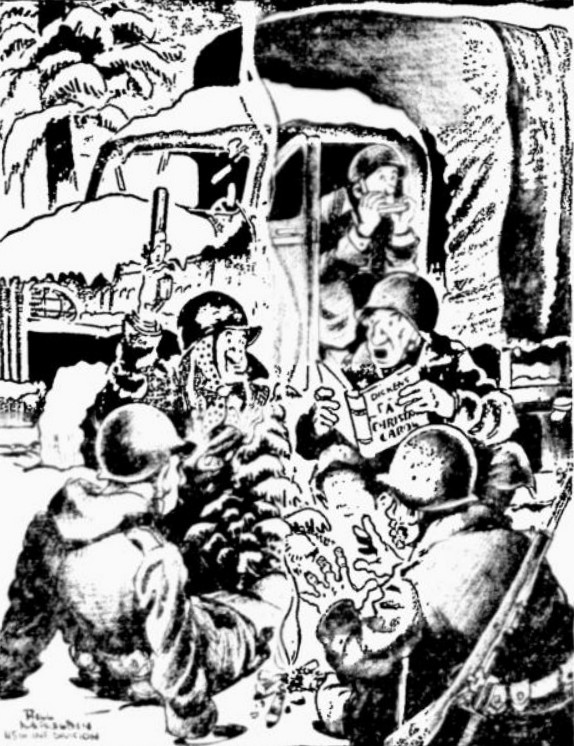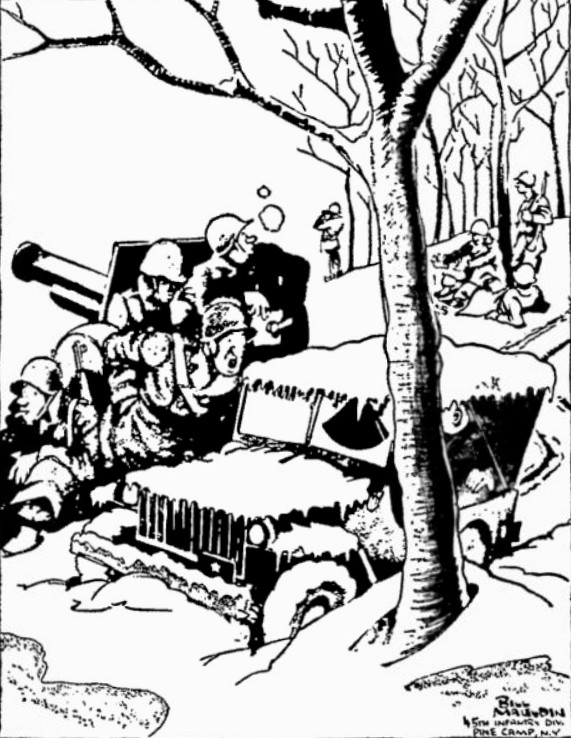The Pittsburgh Press (January 6, 1944)

Roving Reporter
By Ernie Pyle
At the frontlines in Italy – (by wireless)
The Italian mules we’ve been using to pack supplies to our troops fighting in the mountains are smaller and weaker than the average American mule. Also, they have been taken around in trucks from one place to another until a lot of them are sick from it.
At first, we misjudged them and put too heavy a load on them. In fact, we put on more than an American mule could carry over such a trail. We lashed on four cans of water and two cases of rations, making a load of around 240 pounds. The mules just couldn’t take it. They’d all be sick next day. So now we load them with only two cans of water and one of rations, cutting the weight to 120 pounds.
They say the Italians are cruel to their mules on the trail but take good care of them when they’re not working.
The Italian method of saving “giddyap” to a mule is to go “brrrrr,” the way we do when we are cold. If you stand along the pack trail at night and listen to the skinners’ “brr-ing” their miles upward, it sounds as if the whole population is freezing to death.
At first, there were some white mules in the pack train, but they were too easy to see by moonlight, so we stopped using them. A few hours are used in some of the outfits, and several were discovered with the brand of the Italian royal family.
Mule shoe shortage
When the mules arrived from Sardinia, the most pressing problem was to get them shod. It took days to scour the country and jig up shoes for them. Then horseshoe nails became the problem. They finally found enough racetrack nails to do the job.
Horseshoe nails are so scarce and so precious in Italy that the nails had to be counted out to the civilian blacksmiths to keep them from stealing them. If a smith broke a nail, he had to bring the pieces back before he could get another one.
Some of the pack trains are run exclusively by Americans. I’ve been told the Americans are better mule skinners than the Italians and I’ve also been told the opposite, so I don’t know which is right. But as one soldier said about the Americans:
Them old city boys hadn’t never fooled around with mules before, so they didn’t go so good at first.
In emergencies, some pack trains were sent up the mountains in the daytime, but it was dangerous business, for the Germans kept the trail pretty well plastered with shells.
Luckily there have been no casualties on the trail in my outfit, but seven Italian soldiers were wounded in the mule pack in a dive-bombing.
The Italians are very nervous about bombs and shells. Any night the shells stary dropping too close to the mule pack, the Italians disappear into their foxholes as if by magic, and you can never find them in the dark to rout them out again.
The men have fared much better than the mules, for unfortunately a mule doesn’t know about foxholes. My outfit alone has lost 50 mules to shellfire and bombing, and another 100 are sick from overwork and too much riding around in trucks.
Interpreters for the asking
The Italian mule outfit is under two Italian lieutenants who wear plumed Tyrolean caps and look sort of romantic. Neither of them speaks English, but in the American Army you only have to tell twice a find a soldier who speaks Italian, so the little group has an interpreter. Everybody has to depend so heavily upon him that he practically runs the show.
He is Cpl. Anthony Savino of Newark, New Jersey. His job would drive anybody crazy. The Italians are not as quick as efficient as we are, and about the time Savino gets a pack train all ready, everything collapses and chaos takes place. Then he catches it from both sides.
The officer in charge of this mule pack is Lt. Harmon W. Williams of Flint, Michigan. He was named after Gen. Harmon, who won fame in the last war. Some nights Lt. Williams is up till 3:00 a.m. seeing that all the skinners get back down the mountain. Other nights he gets to bed as early as 7:00 p.m. he sleeps whenever he can. For it’s an unusual night when he isn’t routed out to get some emergency supplies to the top.
He sleeps in a stone cowshed along with a dozen of his enlisted men. He was an undertaker in civil life, and is an anti-tank man in the Army, but a mule expert for the moment.
Cpl. Savino takes his interpreting job so seriously that he even talks about it in his sleep. I slept in the same cowshed with the boys, and one night when I happened to wake up about 3:00 a.m., I heard Savino saying:
Well, if we can’t use them as interpreters, let’s make guides out of them.
He thought that was pretty funny when I told him about it. He had never known before that he talked in his sleep.


